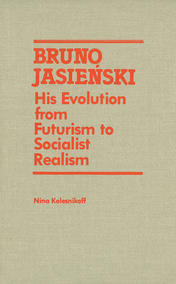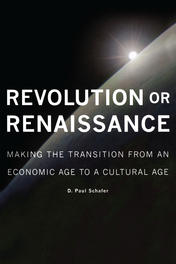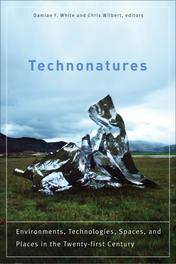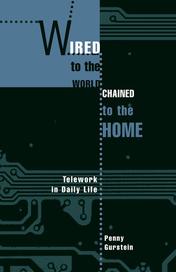Future Studies



Excerpt from the Introduction, Technonatures: Environments, Technologies Spaces, and Places in the Twenty-first Century edited Damian F. White and Chris Wilbert
The expansion of mankind, both in numbers and per capita exploitation of Earth's resources, has been astounding. To give a few examples: During the past three centuries human population increased tenfold to 6000 million, accompanied e. g. by a growth in cattle population to 1400 million (about one cow per average size family). Urbanisation has even increased tenfold in the past century. In a few generations mankind is exhausting the fossil fuels that were generated over several hundred million years. The release of SO2, globally about 160 Tg/year to the atmosphere by coal and oil burning, is at least two times larger than the sum of all natural emissions, occurring mainly as marine dimethyl-sulfide from the ocean . . . Considering these and many other major and still growing impacts of human activities on earth and atmosphere, and at all, including global, scales, it seems to us more than appropriate to emphasize the central role of mankind in geology and ecology by proposing to use the term “anthropocene” for the current geological epoch.
– Crutzen and Stoermer (2000)
Increasingly in future . . . the time will come, for example, when massive programmes will have to be set in train to regulate the relationship between oxygen, ozone, and carbon dioxide in the earths atmosphere. In this perspective, environmental ecology could equally be re-named “machinic ecology”, since both cosmic and human practice are nothing if not machinici—indeed they are machines of war, in so far as “Nature” has always been at war with life!
– Felix Guattari, The Three Ecologies (2000)
Political ecology, at least in its theories, has to let go of nature. Indeed, nature is the chief obstacle that has always hampered the development of public discourse.
– Bruno Latour, The Politics of Nature (2004)
. .. far from being dead and buried, nature is currently being practiced anew . .. But that nature is not what we have imagined it to be, fixed in its identity and unrelated to society.
– Steve Hinchliffe, Geographies of Nature (2008)
The Environmental Debate in Changing Times?
The current state of “the environmental debate” is in considerable flux at the beginning of the twenty-first century. From European Union countries to Argentina, from India to Canada, or China, Egypt, and beyond, diverse societies find themselves gripped by controversies, dilemmas, and disputes emerging from the incorporation and resistance of human and non-human bodies, ecologies and landscapes into circuits of commodification, property regulation, innovation, patenting, and enclosure. Disputes surrounding nanotechnology, biotechnology, and global warming, and concerns over biodiversity, water resources, and food—to name just a few acute issues—lend credence to the perception that natures, societies, and technologies are being jointly made and remade at dizzying speeds (Braun and Castree 1998). According to many writers (Haraway 1991, 1998; Luke 1997, 1999; Guattari 2000; Braun and Castree 1998), a seemingly unbounded, technologically instilled, and ideologically renewed capitalism appears to be intensifying the creative destruction of diverse ecologies around the globe even as it lurches unsteadily from boom to bust. Yet the movements that have been at the centre of politicizing these processes of remaking—notably the diverse ecological and green social movements that exploded onto the political scene with so much force in the last quarter of the twentieth century—seem politically and intellectually disorientated by such developments. Indeed, if we follow the thoughts of Bruno Latour,”the politics of nature” is increasingly marked by a degree of stagnation (2004, 1).
Latour is of course a leading provocateur whose work is defined by a penchant for the dramatic (see Castree 2006). Yet, at a time when the “environmental question& edquo; is at least rhetorically moving toward centre stage in the political world, the claim that there has concurrently been a loss of confidence, coherence, and vigour among certain manifestations of environmentalism is an assertion that has been reiterated recently by a much broader array of academic and activist voices, from different parts of the globe.
Some have pointed to the nervous and unsteady responses in Europe to the controversies raised by Bjorn Lomborg's The Skeptical Environmentalist (2001) and the subsequent Lomborg affair. 1 Others have suggested a certain plateauing of support can be detected in public opinion surveys for mainstream environmental organizations from the UK to Australia (MacNaghten 2003, 63; Davison in this volume). In the United States, it is Shellenberger and Nordhaus's internal critique of the mighty US environmental movement “The Death of Environmentalism” (2005) that has most crystallized concerns. While maintaining that mainstream environmental movements in the US have made important regulatory gains over the last three decades in the fight for basic environmental protection, Shellenberger and Nordhaus have suggested over more recent decades—and with particular reference to global warming—that little further progress has been made. The dominant US environmental groups, they contend, are failing to generate a credible vision of the future or the political alliances that could bring “progress” about. More recently, they have refined this critique (Nordhaus and Shellenberger 2007) to argue that the manner in which much conventional mainstream environmental critique has relied on a narrative which problematizes human agencies within the context of a static and a-historical image of “Nature” has lead to a “politics of limits” that itself has significantly constrained the imaginative capacities to rethink a productive, progressive politics of the environment.



